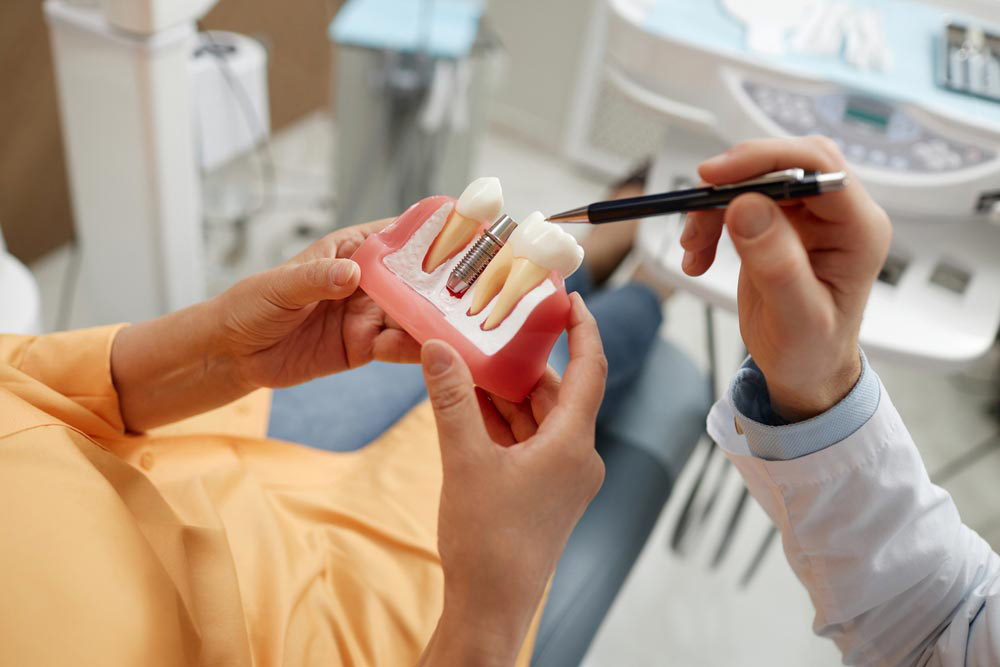
Dental implants are a major investment in your smile and overall health. Once you’ve undergone the procedure, it’s important to take steps that could help these new additions to your oral architecture last as long as possible. Whether your implants have just been fitted or you are still considering the procedure, learning how to care for them after surgery could assist in maintaining optimal oral health and potentially prolong the lifespan of your implants. In this blog, we will explore four tips for caring for your dental implants post-surgery.
1. Schedule Regular Dental Check-ups
Maintaining regular visits to your dentist is considered crucial following dental implant surgery. These check-ups might help your dental professional monitor the healing process and possibly help with the successful integration of your implants with your jawbone:
- Monitor Healing: Early detection of potential issues can help prevent complications.
- Professional Cleaning: Implants might require careful cleaning with specialised tools to help prevent gum disease.
- Ongoing Support: Regular visits could provide an opportunity to discuss any concerns and receive professional advice on care techniques.
2. Adopt a Tailored Oral Hygiene Routine
Post-surgery oral hygiene might need to be more meticulous than usual. Your daily routine could require some adjustments to accommodate your new implants better:
- Brushing: Use a soft-bristled toothbrush to gently clean around the implants twice daily. This gentle approach might avoid irritation to the surrounding gums.
- Flossing: Utilise implant-specific floss to remove plaque under and around the gums and implant. Regular flossing might help reduce the risk of peri-implant diseases.
- Specialised Products: Consider products recommended by your dentist. These products might help keep hard-to-reach areas around implants clean.
3. Address Immediate Issues: Recognising Potential Signs of Trouble
It’s generally a good idea to be proactive about any complications to help maintain the health of your dental implants. Being aware of signs that could require immediate dental attention can be helpful:
- Discomfort or Pain: While some discomfort is normal, persistent or increasing pain is not and should be checked.
- Swelling or Redness: These could indicate infection, especially if they persist beyond the initial healing period.
- Loose Implants: Any feeling of movement in your implant might necessitate a prompt visit to your dentist.
Explore Your Dental Care Options: Contact Us!
At Pain Free Dental Clinic, we aim to offer comprehensive services for your dental implants. Our dentists in Southern Highlands are equipped with modern technologies and methods designed to effectively support your dental health needs. Whether you’ve recently had implant surgery or are contemplating it, feel free to reach out via our contact page or call us for more details.
Latest Posts
4 Tips For Maintaining Oral Health After Dental Implant Surgery
Dental implants are a major investment in your smile and overall health. Once you’ve undergone the procedure, it’s important to take steps that could help
4 Myths About Dental Implants Debunked
In the world of dental health, the discussion around dental implants often brings various myths and misunderstandings. It’s quite natural; substituting missing teeth with artificial
Practical Tips For Long-lasting Implant Success
Dental implants are a strong and visually appealing solution for replacing missing teeth. However, maintaining them requires regular care and maintenance. Good dental hygiene practices
Benefits Of Maintaining A Regular Dental Checkup
Maintaining good health is a comprehensive approach, encompassing various aspects of our lifestyle, and one of the most integral yet often neglected parts is oral
What Is Bone Graft For Dental Implant?
When considering the journey towards a dental implant, one critical step often surfaces in discussions with your dentist: the bone graft. This procedure may sound
Is Invisalign Worth the Investment?
When it comes to straightening your teeth, you have various options to consider. One increasingly popular choice is Invisalign, often marketed as a convenient and

